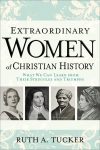“One Half of the World does not know how the Other Half lives,” wrote Benjamin Franklin in Poor Richard’s Almanack. That is certainly true of church history, the standard volumes of which are dominated by accounts of the thoughts and deeds of men. Ruth A. Tucker’s Extraordinary Women of Christian History tells readers about the “Other Half” of Christendom by means of biographical snippets of famous Christian women.
Tucker has served as a professor of church history at Trinity Evangelical Divinity School and Calvin Theological Seminary. She is best-known for her biographical approach to both the history of Christian missions in From Jerusalem to Irian Jaya and of church history more generally in Parade of Faith. In 1986, she and Walter L. Liefeld coauthored Daughters of the Church, which is a systematic account of “Women and ministry from New Testament times to the present,” in the words of the book’s subtitle.
Like Daughters of the Church, Extraordinary Women arranges its material chronologically. Chapter 1 begins with the apocryphal, but nonetheless influential, Thecla, erstwhile missionary compassion of the apostle Paul. Chapter 14 ends with Helen Roseveare, missionary doctor to the Congo in a time of civil war. Along the way, readers peak into the lives of women, both Catholic and Protestant, some married but others not, who professed the Christian faith with their thoughts, lives, and deeds.
From the outset, Tucker confesses that her accounts of these women’s lives will be anything but hagiographical. Analogizing her choice of subjects to “the tastiest candy from this sampler box of chocolates,” she notes that “in many cases [i.e., other writes’ accounts of these women’s lives] the candy is too sweet for the palate—sugarcoated heroines.” Tucker’s accounts are anything but sugarcoated. Indeed, if anything, they tend toward bitter chocolate. She writes, “I was struck by how many failed marriages and failed ministries had become added ingredients of this volume” (x). At times, this non-sugarcoated approach becomes too much, as if the failures outweighed the successes, at least to my mind.
Regardless, I appreciate Tucker’s reminder: “These women are anything but the super-saints of pious heroine tales. They are real people, and they are like us” (x). There is hope in that statement. God can make a beautiful thing out of the crooked timber of humanity.
One final takeaway as a male reader—or rather, a question. The women Tucker portrays advanced the kingdom of God despite opposition, especially the opposition that arose because so many of them labored against the grain of traditional gender roles and expectations. Ironically, the Protestant Reformation made the leadership of women even more difficult. “Protestants disdained monasticism,” Tucker writes, “which incidentally had been the primary path to ministry for women” (53). One can feel the sting of that opposition to women’s contributions in the complaint of nineteenth-century preacher and social reformer Phoebe Palmer:
We believe that hundreds of conscientious, sensitive Christian women have actually suffered more under the slowly crucifying process to which they have been subjected by men who bear the Christian name than many a martyr has endured in passing through the flames (148).
Interestingly, Palmer countered this “crucifying process” with a long, rigorous defense of women’s preaching ministry in a book whose title alludes to the outpouring of the Holy Spirit on the Day of Pentecost, as recorded in Acts 2—Promise of the Father.
The question(s), then, that rises from reading Extraordinary Women of Christian History is this: If the Spirit has been poured out upon “all people,” both “sons and daughters” (Acts 2:17, cf. Joel 2:28), why do so many churches continue to erect barriers to the full involvement of women in all of their ministries? Would not the work of the kingdom advance more steadily if its daughters were not unduly hindered? The women whose lives Tucker sketches did much. One cannot help but wonder whether they could have done much more, had they worked without hindrance from within the church.
 Book Reviewed
Book Reviewed
Ruth A. Tucker, Extraordinary Women of Christian History: What We Can Learn from Their Struggles and Triumphs (Grand Rapids, MI: Baker Books, 2016).
P.S. If you found my review helpful, please vote “Yes” on my Amazon.com review page.
Leave a reply to Laura Cancel reply